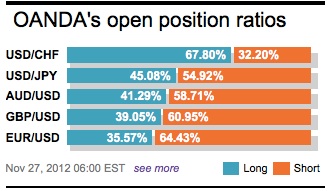For so long, nothing exciting happens and then a plethora of news events has this market again sitting up embracing movement. I nearly said volatility, but alas, a tad too strong so early in the count. In the past 24hrs alone, the Eurocrats have concocted another Greek agreement, while the BoE have hijacked Canada’s top financial guru to be one of their own. King and others have crossed the Atlantic to capture their first foreign leader in the 318 history of the Bank of England. Only one of these events has good odds of surviving and making an impact.
The Euro markets this morning are giving a muted response to the ‘inevitable’ news that the Eurocrats have finally reached an agreement on Greece’s next tranche of aid. This agreement will allow the Eurozone to funnel billions of aid back into the country by year-end and allowing another crisis to be immediately averted. Again, the ‘can’ has been successfully kicked down the road. The immediate reaction has periphery nation yields ease ever so slightly, and global equities creep a tad higher as some investors shy away from the safer-haven Bund. The muted market response would suggest that a Greek solution was somewhat priced in.
The Euro finance ministers have agreed to cut Greece’s debt to +124% of GDP by 2020, a compromise, relative to earlier IMF demands for a target of 120%. The €40b in debt reduction will supposedly come from three main sources. First, interest rate on bilateral loans to Greece will be cut by +100bps to +50bps and these loans will be termed out by 15-years. Interest payments on loans from the new package will be deferred for 10-years. Second, all member governments have agreed to transfer their income gains from the ECB’s holdings of Greek bonds back to Greece. This funneling of income will exclude any country member already receiving financial aid. Finally, Greece is to conduct a debt buyback.

To appease the IMF’s Lagarde, who has been a stickler for more aggressive Greek benchmarks, the release of its share of income funds to Greece is contingent on any buyback being successful. In the bigger picture, creditors again have refused to take a haircut on current outstanding debts. In the end it’s rather simple, global investors only want to know whether these programmed concessions will allow Greek finances to become more sustainable? Will they allow Greece to return and seek independent market financing by 2017? Time can only tell. However, we can expect other countries, like Ireland, to seek an adjustment of their own terms.
Data Stateside this morning is expected to show further signs of the impact of Hurricane Sandy. Analysts are anticipating the US durable goods release to pare back some of the stronger headline reported in September, and a sharp correction in consumer confidence. The latter release in particular is expected to suffer from the halt in economic activity and damages caused by the recent hurricane on the US east coast. Any outsized market misses will be capable of pushing US front end yields lower, and provide further negative implications for dollar outright against the Yen. This will only provide more of a headache for the BoJ.

The gradual unwinding of the single currency strength fits the current majority of opinion. The real test for the EUR in the overnight session was the temporary pop for the currency outright above 1.30. The lack of time spent up there is rather telling. This psychological level indicated that a clear majority of traders favored setting up shorts. The orderly decline of the EUR ever since, further indicates that the bulk of investors currently have the position that best suits them. Despite the intraday charts indicating overbought EUR signals, there remains scope for a retest higher again where stops are firmly planted. Through 1.3025-topside and this market will become rather messy. Initial support now appears firmly at 1.2915-20

Other Links:
Greek Haircut puts German Political Capital at Stake
This article is for general information purposes only. It is not investment advice or a solution to buy or sell securities. Opinions are the authors; not necessarily that of OANDA Corporation or any of its affiliates, subsidiaries, officers or directors. Leveraged trading is high risk and not suitable for all. You could lose all of your deposited funds.


